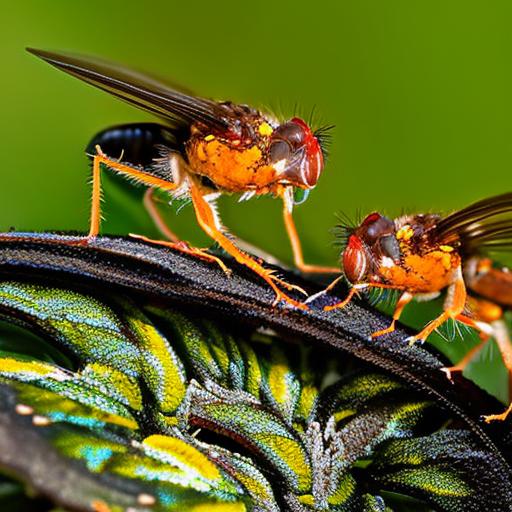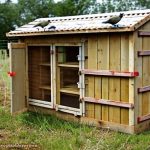Keeping flies away from your chickens is essential for maintaining a healthy and happy flock. Flies can cause a range of health problems for your chickens, including the spread of diseases and parasites. They can also cause stress and discomfort for your chickens, leading to decreased egg production and overall poor health. By understanding the risks associated with flying pests in your chicken coop and implementing effective control methods, you can ensure that your chickens are protected from these harmful insects.
Key Takeaways
- Keeping flies away from your chickens is important for their health and well-being.
- Flying pests in your chicken coop can pose serious health risks to your birds.
- Identifying common types of flies and other flying pests in your chicken coop is crucial for effective control.
- Natural and chemical methods can be used to control flies and other flying pests, but proper sanitation and hygiene are key.
- Managing moisture levels, proper feeding and waste management, and creating a fly-proof coop are all essential for keeping your chickens fly-free.
Understanding the Risks Associated with Flying Pests in Your Chicken Coop
Flies can spread diseases and parasites to your chickens, putting their health at risk. Some common diseases that flies can transmit include avian influenza, salmonella, and Newcastle disease. These diseases can have devastating effects on your flock, leading to illness, decreased egg production, and even death. In addition to diseases, flies can also carry parasites such as mites and lice, which can cause irritation and discomfort for your chickens.
Furthermore, flies can cause stress and discomfort for your chickens. The constant buzzing and biting of flies can lead to increased stress levels in your flock, which can negatively impact their overall well-being. Stressed chickens may exhibit behaviors such as feather pecking, aggression, and reduced egg production. By keeping flies away from your chickens, you can help reduce their stress levels and promote a healthier environment for them to thrive in.
Identifying Common Types of Flies and Other Flying Pests in Your Chicken Coop
There are several common types of flies that you may encounter in your chicken coop. House flies are one of the most common types of flies found in chicken coops. They are attracted to the smell of manure and decaying organic matter, making the coop an ideal breeding ground for them. Stable flies are another common pest in chicken coops. They resemble house flies but have a painful bite, which can cause discomfort for your chickens. Black soldier flies are also commonly found in chicken coops. While they do not bite or spread diseases, their larvae can be a nuisance and compete with your chickens for food.
In addition to flies, other pests such as mosquitoes and mites can also be problematic in your chicken coop. Mosquitoes are known for transmitting diseases such as West Nile virus and avian malaria. They are attracted to standing water, so it is important to eliminate any sources of stagnant water in and around your coop. Mites are tiny parasites that can infest your chickens’ feathers and skin, causing irritation and discomfort. Regularly inspecting your chickens for signs of mites and taking appropriate measures to control them is crucial for maintaining a healthy flock.
Natural and Chemical Methods for Controlling Flies and Other Flying Pests
| Method | Description | Effectiveness | Cost |
|---|---|---|---|
| Sticky Traps | Yellow sticky traps attract and trap flying pests. | Low to moderate | Low |
| Essential Oils | Essential oils like peppermint, lavender, and eucalyptus can repel flies and other pests. | Low to moderate | Low to moderate |
| Biological Control | Introducing natural predators like parasitic wasps or nematodes to control pest populations. | High | Moderate to high |
| Insecticides | Chemical sprays or baits that kill flying pests. | High | Moderate to high |
| UV Light Traps | Traps that use ultraviolet light to attract and kill flying pests. | High | Moderate to high |
There are various methods you can use to control flies and other flying pests in your chicken coop. Natural methods include using herbs, essential oils, and fly traps. Herbs such as lavender, mint, and basil have natural insect-repellent properties and can be planted around the coop to deter flies. Essential oils such as citronella, eucalyptus, and lemongrass can also be used as natural fly repellents. Simply dilute a few drops of the essential oil in water and spray it around the coop.
Fly traps are another effective natural method for controlling flies. There are various types of fly traps available, including sticky traps and bait traps. Sticky traps use a sticky substance to trap flies, while bait traps attract flies with a lure such as rotting fruit or vinegar. These traps can help reduce fly populations in your coop.
Chemical methods for controlling flies include the use of insecticides and larvicides. Insecticides can be sprayed directly on flies to kill them on contact. However, it is important to use insecticides that are safe for use around chickens and follow the instructions carefully. Larvicides, on the other hand, target fly larvae and prevent them from developing into adult flies. These can be applied to areas where flies lay their eggs, such as manure piles or wet areas.
The Role of Proper Sanitation and Hygiene in Preventing Fly Infestations
Proper sanitation and hygiene are crucial for preventing fly infestations in your chicken coop. Regular cleaning and disinfecting of the coop and surrounding areas can help eliminate fly breeding grounds. Remove any wet or soiled bedding, as flies are attracted to moisture. Clean the coop thoroughly, paying special attention to areas where flies may hide or lay their eggs, such as cracks and crevices.
Proper waste management is also important for preventing fly infestations. Flies are attracted to manure and decaying organic matter, so it is important to properly manage and dispose of chicken waste. Regularly remove manure from the coop and compost it in a designated area away from the coop. This will help reduce fly populations and prevent the spread of diseases.
Tips for Managing Moisture Levels in Your Chicken Coop to Deter Flies

Flies thrive in moist environments, so managing moisture levels in your chicken coop is key to deterring them. One way to do this is by using absorbent materials such as sand or straw as bedding. These materials can help absorb moisture and keep the coop dry. Regularly replace wet bedding with fresh, dry bedding to maintain optimal moisture levels.
Proper ventilation is also important for managing moisture levels in the coop. Good airflow can help prevent condensation and reduce humidity, making the environment less favorable for flies. Install vents or windows in the coop to promote air circulation. However, be sure to screen these openings to prevent flies from entering.
The Importance of Proper Feeding and Waste Management to Keep Flies at Bay
Proper feeding and waste management practices can help reduce fly populations in your chicken coop. Feeding your chickens a balanced diet can help reduce waste and attract fewer flies. Avoid overfeeding your chickens, as excess food can attract flies. Provide only the amount of feed that your chickens can consume in a day.
Proper waste management is also crucial for keeping flies at bay. As mentioned earlier, regularly removing manure from the coop and composting it can help reduce fly populations. In addition, consider using a deep litter system, which involves adding a layer of carbon-rich material such as straw or wood shavings to the coop floor. This material helps absorb moisture and control odors, making the environment less attractive to flies.
Creating a Fly-Proof Chicken Coop: Essential Features and Design Considerations
Creating a fly-proof chicken coop is essential for keeping flies away from your chickens. There are several features and design considerations that can help achieve this. First, ensure that the coop has screened windows and doors to prevent flies from entering. Use fine mesh screens that are small enough to keep out even the smallest flies.
Proper ventilation is also important for deterring flies. Install vents or windows in the coop to promote air circulation and reduce humidity. However, be sure to screen these openings to prevent flies from entering.
Lighting can also play a role in deterring flies. Flies are attracted to light, so consider using yellow or red light bulbs in the coop instead of white or blue ones. This will make the coop less attractive to flies.
Best Practices for Monitoring and Controlling Fly Populations in Your Chicken Coop
Regularly monitoring and controlling fly populations in your chicken coop is crucial for maintaining a healthy environment for your chickens. Inspect the coop regularly for signs of fly activity, such as fly larvae or adult flies. If you notice an increase in fly populations, take immediate action to control them.
Using fly traps can be an effective way to monitor and control fly populations. Place traps in areas where flies are commonly found, such as near manure piles or wet areas. Regularly check the traps and dispose of any captured flies.
If fly infestations persist despite your best efforts, it may be necessary to seek professional help. Pest control professionals can assess the situation and provide targeted treatments to eliminate flies from your coop.
Keeping Your Chickens Happy, Healthy, and Fly-Free
By following these tips and best practices, you can keep your chickens happy and healthy while keeping flies at bay. Understanding the risks associated with flying pests in your chicken coop and implementing effective control methods is essential for maintaining a healthy flock. Remember to prioritize proper sanitation and hygiene, manage moisture levels, and implement fly-proofing measures in your coop. By doing so, you can create a fly-free environment for your chickens to thrive in.
If you’re looking for ways to keep flies away from your chickens, you might also be interested in learning how to turn a shed into a chicken coop. This article from Poultry Wizard provides step-by-step instructions on transforming a shed into a functional and fly-free space for your feathered friends. Check it out here!
FAQs
What are some common problems caused by flies around chickens?
Flies can cause a range of problems for chickens, including the spread of disease, irritation, and stress. They can also lay eggs in chicken feed, leading to contamination and reduced feed quality.
What are some effective ways to keep flies away from chickens?
Some effective ways to keep flies away from chickens include keeping the coop clean and dry, using fly traps and repellents, providing proper ventilation, and using herbs and essential oils that repel flies.
What are some natural remedies for keeping flies away from chickens?
Some natural remedies for keeping flies away from chickens include using herbs like lavender, mint, and basil, essential oils like citronella and eucalyptus, and diatomaceous earth.
How often should the chicken coop be cleaned to prevent flies?
The chicken coop should be cleaned at least once a week to prevent flies. This includes removing any wet or soiled bedding, cleaning the feeders and waterers, and removing any debris or waste from the coop.
What are some signs that flies are causing problems for chickens?
Some signs that flies are causing problems for chickens include increased stress and agitation, reduced egg production, and the presence of maggots in the coop or feed. Chickens may also exhibit signs of irritation, such as excessive scratching or pecking at their feathers.
Meet Walter, the feathered-friend fanatic of Florida! Nestled in the sunshine state, Walter struts through life with his feathered companions, clucking his way to happiness. With a coop that’s fancier than a five-star hotel, he’s the Don Juan of the chicken world. When he’s not teaching his hens to do the cha-cha, you’ll find him in a heated debate with his prized rooster, Sir Clucks-a-Lot. Walter’s poultry passion is no yolk; he’s the sunny-side-up guy you never knew you needed in your flock of friends!







